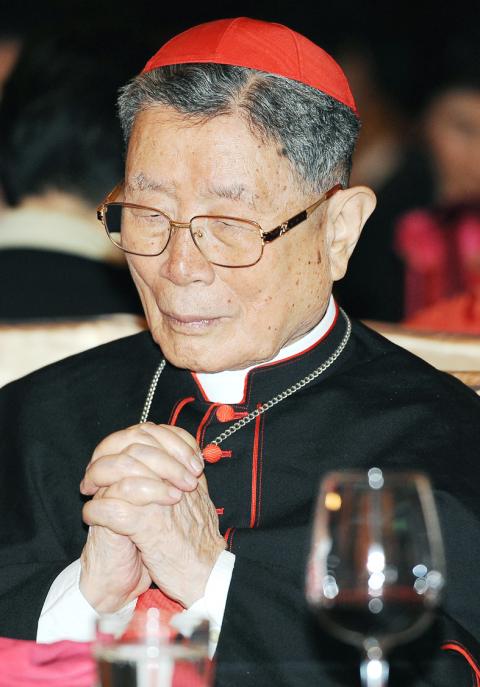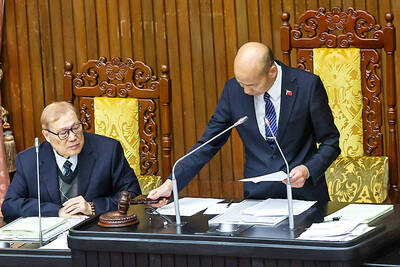Cardinal Paul Shan (單國璽) passed away at Cardinal Tien Hospital at 6:42pm yesterday from pneumonia, hospital authorities said.
Born in 1923 in Henan Province, China, Shan became a priest in the Philippines in 1955 and subsequently became the first cardinal in Taiwan after being appointed by Pope John Paul II in 1998.
Hsu Cheng-tao (許承道), a pastor and spokesman for the Presbyterian Church in Taiwan, said he was saddened to hear of the passing of a leading figure in Taiwan’s religious community.

Photo: Chu Pei-hsiung, Taipei Times
Although the Roman Catholic Church has been divided from Protestant denominations for more than 500 years, the Catholic Church has been calling for dialogue since the 1960s, Hsu said.
He added that Shan had spearheaded efforts to reconcile the churches in Taiwan.
Shan also maintained close contact with Buddhist figures such as Dharma Drum Mountain (法鼓山) Master Sheng Yen (聖嚴法師) and Master Hsing Yun (星雲法師), founder of the Buddhist organization Fo Guang Shan.
The contacts helped contribute to interaction between the major religious groups in Taiwan.
Prior to his passing, Shan toured all seven dioceses in Taiwan to talk about his life.
Through his belief in Christ, he said he had gained a connection with eternal life, making death a tunnel, not an end, through which one must pass to enter the next life.
“Although many people greatly anticipate their next lives, one must use one’s time in this life wisely and make the most of every day that the Lord gives us,” Shan said.
Additional reporting by Jennifer Huang

DEFENDING DEMOCRACY: Taiwan shares the same values as those that fought in WWII, and nations must unite to halt the expansion of a new authoritarian bloc, Lai said The government yesterday held a commemoration ceremony for Victory in Europe (V-E) Day, joining the rest of the world for the first time to mark the anniversary of the end of World War II in Europe. Taiwan honoring V-E Day signifies “our growing connections with the international community,” President William Lai (賴清德) said at a reception in Taipei on the 80th anniversary of V-E Day. One of the major lessons of World War II is that “authoritarianism and aggression lead only to slaughter, tragedy and greater inequality,” Lai said. Even more importantly, the war also taught people that “those who cherish peace cannot

STEADFAST FRIEND: The bills encourage increased Taiwan-US engagement and address China’s distortion of UN Resolution 2758 to isolate Taiwan internationally The Presidential Office yesterday thanked the US House of Representatives for unanimously passing two Taiwan-related bills highlighting its solid support for Taiwan’s democracy and global participation, and for deepening bilateral relations. One of the bills, the Taiwan Assurance Implementation Act, requires the US Department of State to periodically review its guidelines for engagement with Taiwan, and report to the US Congress on the guidelines and plans to lift self-imposed limitations on US-Taiwan engagement. The other bill is the Taiwan International Solidarity Act, which clarifies that UN Resolution 2758 does not address the issue of the representation of Taiwan or its people in

The Philippines yesterday criticized a “high-risk” maneuver by a Chinese vessel near the disputed Scarborough Shoal (Huangyan Island, 黃岩島) in a rare incident involving warships from the two navies. The Scarborough Shoal — a triangular chain of reefs and rocks in the contested South China Sea — has been a flash point between the countries since China seized it from the Philippines in 2012. Taiwan also claims the shoal. Monday’s encounter took place approximately 11.8 nautical miles (22km) southeast” of the Scarborough Shoal, the Philippine military said, during ongoing US-Philippine military exercises that Beijing has criticized as destabilizing. “The Chinese frigate BN 554 was

LEISURE: The new law adds Confucius’ birthday, the anniversary of the Battle of Guningtou, Constitution Day and Little New Year as national holidays The Legislative Yuan yesterday passed new legislation adding four national holidays and making Workers’ Day a national holiday for all sectors. The Chinese Nationalist Party (KMT) and the Taiwan People’s Party used their combined majority in the legislature to push the jointly proposed draft through its third and final reading. This new law supersedes the existing regulations for the implementation of memorial days and state holidays, which are administered by the Ministry of the Interior. The new law recognizes Confucius’ birthday on Sept. 28, the anniversary of the Battle of Guningtou on Oct. 25, Constitution Day on Dec. 25 and “Little New Year,”